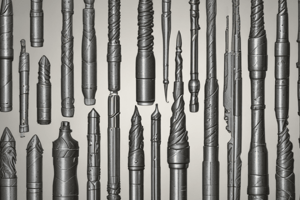Podcast
Questions and Answers
What is the standard temperature range to start heating in automatic hot forging?
What is the standard temperature range to start heating in automatic hot forging?
- 1100℃ to 1200℃
- 1000℃ to 1100℃
- 1300℃ to 1400℃
- 1200℃ to 1300℃ (correct)
Which part of a drill fits into the holding device?
Which part of a drill fits into the holding device?
- Margin
- Web
- Flute
- Shank (correct)
What is the process of heating and then cooling metal to make it less brittle called?
What is the process of heating and then cooling metal to make it less brittle called?
- Press forging
- Hot forging
- Normalizing
- Annealing (correct)
What is a device designed to prevent accidental machine startup during maintenance called?
What is a device designed to prevent accidental machine startup during maintenance called?
Which type of drill press is especially useful for drilling holes in large and heavier pieces?
Which type of drill press is especially useful for drilling holes in large and heavier pieces?
What are the rows of teeth crossing each other on a cutting tool used for?
What are the rows of teeth crossing each other on a cutting tool used for?
What material is commonly used for making the handles of tools and equipment in manual metalworking?
What material is commonly used for making the handles of tools and equipment in manual metalworking?
What is the term for the heavy objects, sharp edges, and electrocutions that pose risks during metalworking?
What is the term for the heavy objects, sharp edges, and electrocutions that pose risks during metalworking?
The process of cutting metal in small pieces with a cold chisel and hammer is called ______.
The process of cutting metal in small pieces with a cold chisel and hammer is called ______.
The narrow section between the flutes of a drill is known as the ______.
The narrow section between the flutes of a drill is known as the ______.
The ______ is a square faced hammer used by smiths on which it is possible to hit directly with a hand hammer.
The ______ is a square faced hammer used by smiths on which it is possible to hit directly with a hand hammer.
The process that improves the crystalline structure of steel is referred to as ______.
The process that improves the crystalline structure of steel is referred to as ______.
A ______ drill press is commonly used in many school shops as well as for small drilling jobs.
A ______ drill press is commonly used in many school shops as well as for small drilling jobs.
The excess metal squeezed out from the die cavities during forging is called ______.
The excess metal squeezed out from the die cavities during forging is called ______.
The heating and then cooling of metal to make it more malleable and ductile is known as ______.
The heating and then cooling of metal to make it more malleable and ductile is known as ______.
The kind of wood that is commonly used for making the handles of tools is ______.
The kind of wood that is commonly used for making the handles of tools is ______.
Flashcards are hidden until you start studying
Study Notes
Drill Parts
- The conical part of a drill is called the point.
- The narrow section between the flutes of a drill is called the web.
- The groove of a drill that carries out chips and admits coolant is called the flute.
- The narrow groove to determine the size of a drill is called the margin.
- The part that fits into the holding device of a drill is called the shank.
Drilling Equipment
- The standard drill press is commonly used in many school shops and for small drilling jobs.
- The machines that drill holes in large and heavier pieces are called a radial drill press.
Forging Processes
- Upset forging increases the diameter of a workpiece by compressing its length.
- Mechanical forging press uses a motor driven flywheel to store energy that drives a ram lighter than a hammer.
- Press forging is a process that uses slow continuous pressure to forge an area.
Heat Treatment
- The standard temperature for starting heating in automatic hot forging is 1200℃ to 1300℃.
- Normalizing is the process of heating and then cooling metal to improve its crystalline structure.
- Annealing is a process of heating and then cooling metal to make the metal less brittle, or more malleable and ductile.
Safety
- Lathe safety includes proper chucking of workpieces and the use of safety guards.
- Material handling hazards include heavy objects, sharp edges, and electrocutions.
- Lockout/Tagout procedures prevent accidental machine start-up during maintenance.
- Chipping is the process of cutting metal in small pieces with a cold chisel and hammer.
- The usual size of a cold chisel is 3/4” to 1”.
Other
- Double cut describes the rows of teeth crossing each other which give the sharp point of a drill.
- The set hammer is a square-faced hammer used by smiths on which is possible to hit directly with a hand hammer.
- Flash is the excess metal squeezed out from the die cavities during forging.
- Surface plate is a cut on a machine and then carefully scrapped by hand.
- The handle of a cold chisel is typically made of hickory.
Drill Parts
- The conical part of a drill is called the point.
- The narrow section between the flutes of a drill is called the web.
- The groove of a drill, known as the flute, carries out chips and admits coolant.
- The narrow groove that determines the size of a drill is called the margin.
- The shank of a drill is the part that fits into the holding device.
Forging Processes
- Normalizing improves the crystalline structure of steel.
- Annealing makes metal less brittle, more malleable, and more ductile by heating and cooling the metal.
- Upset forging increases the diameter of a workpiece by compressing its length.
- Press forging involves applying slow, continuous pressure to the area being forged, similar to kneading.
- Mechanical forging press uses a motor-driven flywheel to store energy and drive a ram lighter than a hammer through a crank or mechanical device.
- Flash is the excess metal squeezed out from the die cavities during forging.
Safety & Tools
- Lockout/ Tagout procedures are safety procedures designed to prevent accidental machine startup during maintenance or repair.
- Chipping is the process of cutting metal into small pieces using a cold chisel and hammer.
- Set hammer is a square-faced hammer used by smiths that can be hit directly with a hand hammer.
- Surface plate is a machine-cut surface that is carefully scraped by hand.
- Standard drill press is commonly used for small drilling jobs in schools and shops.
- Radial drill press is especially useful for drilling holes in large and heavier pieces.
- The typical size of a cold chisel is 3/4” to 1”.
- Hickory wood is commonly used for drill handles.
Lathe Safety
- Proper chucking of workpieces and the use of safety guards are essential for safe lathe operation.
Hot Forging
- The standard temperature to start the heating process in automatic hot forging is 1200℃ to 1300℃.
Material Handling
- Heavy objects, sharp edges, and electrocution are all potential material handling hazards.
Drill Characteristics
- Double cut refers to rows of teeth crossing each other, giving the drill tip sharpness.
Studying That Suits You
Use AI to generate personalized quizzes and flashcards to suit your learning preferences.




